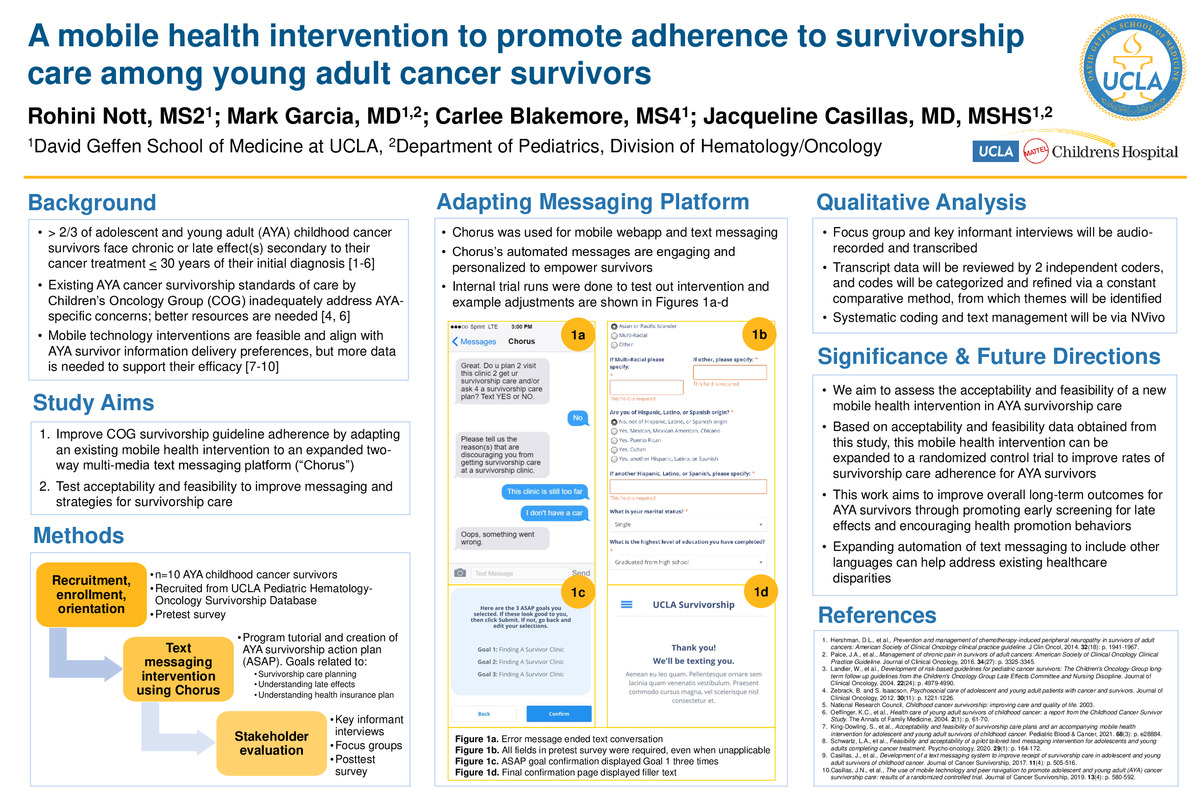-
Author
Rohini Nott -
PI
Jacqueline Casillas, MD, MSHS
-
Co-Author
Mark Garcia, MD; Carlee Blakemore
-
Title
A mobile health intervention to promote adherence to survivorship care among young adult cancer survivors
-
Program
STTP
-
Other Program (if not listed above)
-
Abstract
Background: As a result of advancements in cancer treatment, there has been a rising number of adolescent and young adult (AYA) childhood cancer survivors, many of whom will experience at least one chronic or late effect secondary to their cancer treatment [1]. Current standards of care for AYA cancer survivors inadequately address AYA-specific concerns, and less than half of AYA survivors receive the recommended care [2]. Previous studies have demonstrated that mobile technology interventions are both feasible and align with AYA survivors’ preferences for information delivery [3, 4]; however, a paucity of data exists to support the efficacy of these interventions on improving receipt of survivorship care among AYA survivors. This study builds upon a novel mobile health intervention that demonstrated effectiveness in improving knowledge and attitudes of survivorship care among AYA cancer survivors [5, 6].
Objective: Through the expansion of the previous text messaging intervention to a two-way multi-media mobile phone messaging platform (Chorus), this study aims to determine the acceptability and feasibility of a novel mobile health intervention in a pretest sample of AYA survivors.
Methods: Internal trial runs were conducted over the course of 8 weeks. The research team were prompted to compete the pretest questionnaire, educational tutorial, select AYA Survivorship Action Plan (ASAP) goals, and participate in two-way text messaging based on conversation logics pre-built in Chorus. Technical difficulties were troubleshooted during weekly meetings between the research team and Chorus staff.
Results: Technical difficulties were successfully fixed as a result of the trial run. All fields in pretest questionnaire were set as “required” in order to facilitate complete data. Features such as a status bar and autosave were implemented with the aim of improving user engagement. Typos found in the educational tutorial were corrected. Radio buttons were removed where selection was not necessary. Filler text was replaced with text to facilitate smooth transitions between webpages and provide guidance for what to expect during the text messaging intervention. Two-way automated text messages were internally validated, ensuring automated messages were sent to users as intended based on conversation logics pre-built in Chorus.
Conclusions: A previously-validated text messaging intervention was adapted and enhanced onto a novel mobile phone platform (Chorus). An internal trial run elicited technical issues and “bugs” that were fixed and, thus, improved the usability of the text messaging system. The text messaging intervention is ready for application in a study to determine its acceptability and feasibility among a cohort of AYA cancer survivors. Based on acceptability and feasibility data obtained from this study, this mobile health intervention can be expanded to a randomized control trial to improve rates of survivorship care adherence for AYA survivors.
References
- Howlader, N., et al., SEER Cancer Statistics Review, 1975–2010 In April 2013 Edition. 2013.
- Oeffinger, K.C., et al., Health care of young adult survivors of childhood cancer: a report from the Childhood Cancer Survivor Study. The Annals of Family Medicine, 2004. 2(1): p. 61-70.
- King‐Dowling, S., et al., Acceptability and feasibility of survivorship care plans and an accompanying mobile health intervention for adolescent and young adult survivors of childhood cancer. Pediatric Blood & Cancer, 2021. 68(3): p. e28884.
- Schwartz, L.A., et al., Feasibility and acceptability of a pilot tailored text messaging intervention for adolescents and young adults completing cancer treatment. Psycho‐oncology, 2020. 29(1): p. 164-172.
- Casillas, J., et al., Development of a text messaging system to improve receipt of survivorship care in adolescent and young adult survivors of childhood cancer. Journal of Cancer Survivorship, 2017. 11(4): p. 505-516.
- Casillas, J.N., et al., The use of mobile technology and peer navigation to promote adolescent and young adult (AYA) cancer survivorship care: results of a randomized controlled trial. Journal of Cancer Survivorship, 2019. 13(4): p. 580-592.
-
PDF
-
Zoom
https://uclahs.zoom.us/j/95580776592?pwd=eXV0ZjZCWFZOM3JrNkZ4YnR4amJaQT09

